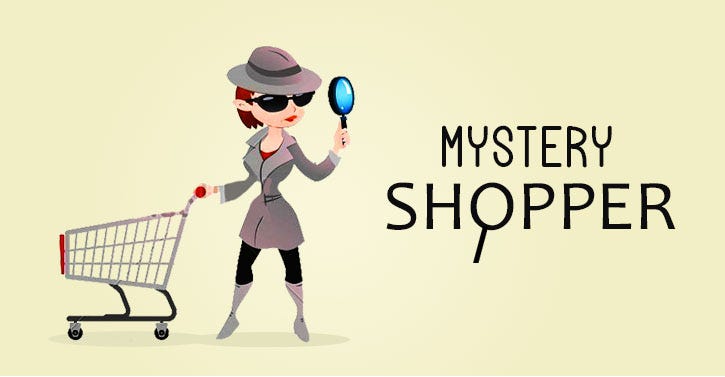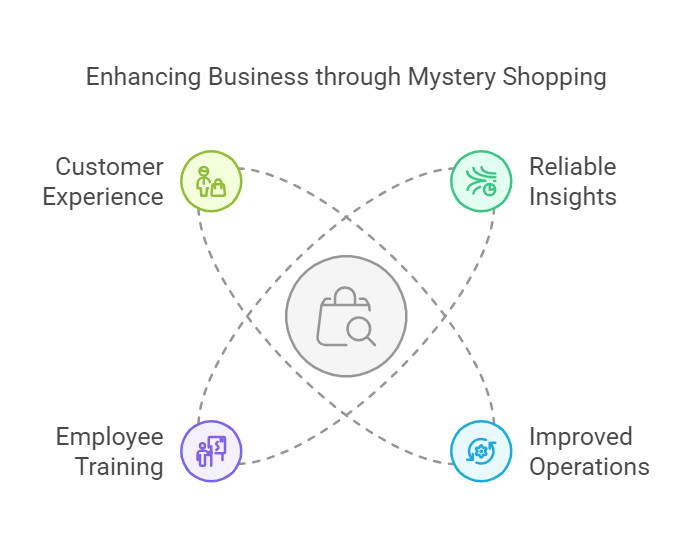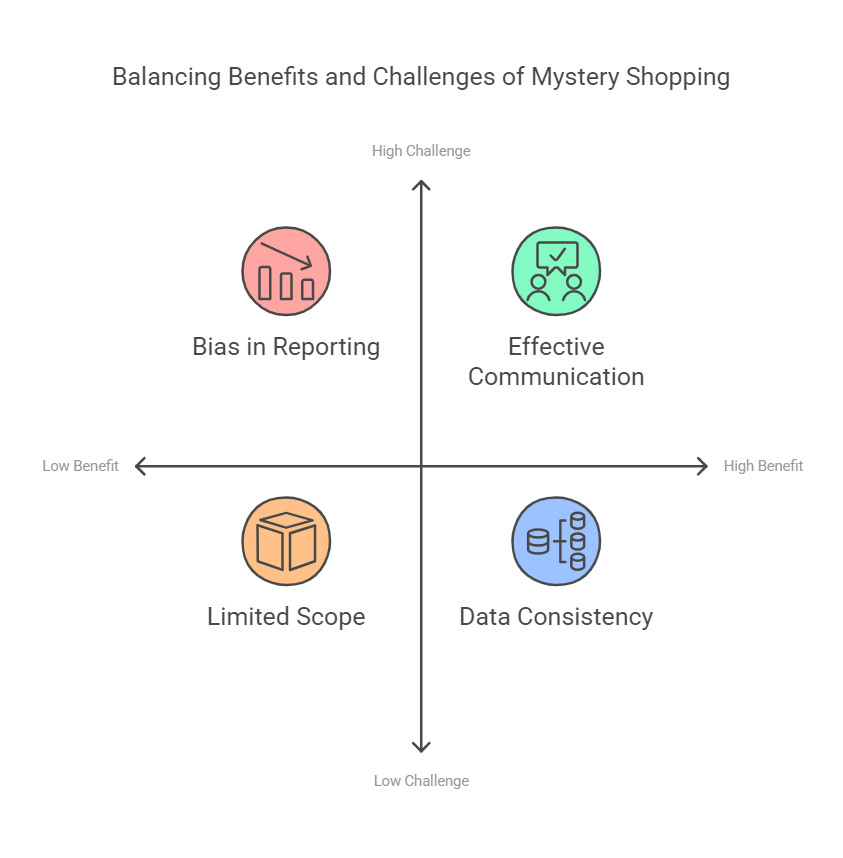- Research platform
Sources of information
Data analysis
Actions
- Solutions
For whom
Problems / Issues
- Materials
Materials
- About us
About us

Mystery shopper programs are key tools for companies wanting improve customer experience and operational efficiency. But when should you use a mystery shopper? Why is it important? This article looks into the diverse roles of mystery shoppers and how they give insights into business. From checking staff to evaluating marketing, mystery shopping shows your organization’s strengths and weaknesses.
Many businesses utilize mystery shopping to gain comprehensive insights into their operations.
In this article, we explore many benefits of mystery shopping. We will identify when to use mystery shopper services and give advice for effective mystery shops. Also, we will mention significant challenges and trends in this field. Whether you’re a small business owner refining service or a manager trying to enhance customer interactions, this guide helps you to utilize mystery shopper tools effectively.
A mystery shopper is a person hired by businesses to assess their services. These mystery shoppers act like regular customers by giving feedback on different parts of the customer experience. The job involves various roles and responsibilities, such as evaluating product quality, staff interactions, and store cleanliness. Their main goal is to aid companies in understanding how effective they are in delivering services in actual settings.
Mystery shoppers engage with businesses similarly to any other customer, ensuring their feedback reflects typical customer experiences.
Mystery shoppers use different methods to evaluate businesses. This involves visiting stores, making calls, or exploring online services, based on the evaluation aim. They follow specific instructions from the hiring company. This ensures their assessments are thorough and consistent. After visits, these shoppers create reports that detail their experience. Such reports help companies who want to raise their operational standards.
Anonymity play a key role in mystery shopping. This helps ensure feedback is authentic and shows true customer experience. When workers do not know they are being observed, they tend to behave normally. This can provide insights that accurately reflect service quality provided. Having this impartial view helps businesses find areas for enhancement and maintain good practices that already exist.

Mystery shopping provides various benefits. It can improve business operations and enhance customer experience. One main benefit is reliable insights. These insights help evaluate the performance of different parts of a business. Companies find strengths and weaknesses in customer service through careful observation. A mystery shopping company helps businesses improve customer service by providing comprehensive market research.
A structured mystery shopping program helps business operations. Mystery shoppers give important feedback about employees. They highlight where employees shine and areas needing work. This leads to better training and refined procedures. The data-driven strategy supports ongoing improvement by measuring a whole host of data points, including critical aspects of customer service levels and brand promises.
Mystery shopping also boosts employee training and accountability. Staff may be evaluated at any moment, so they follow company protocols. This awareness improves the service staff delivers. It helps build a culture focused on quality and excellence in service.
Furthermore, mystery shopping improves the overall customer experience. Businesses learn customer perspectives better. Mystery shoppers share feedback about the entire buying process. They evaluate service, product availability, and store atmosphere. This feedback provides businesses with insights for necessary changes, placing customer needs first.
In short, the advantages of mystery shopper programs go deeper than tracking performance. They enable better employee training, effective operations, and increased customer satisfaction. By appreciating the valuable insights of mystery shoppers, businesses cultivate a responsive environment. This leads to growth and long-term success.
Given these advantages, it is essential for businesses to know when to use mystery shopping evaluations. This ensures maximum effectiveness and quality improvement.
A mystery shopper is a useful tool for businesses seeking insights. Timing for a mystery shopper evaluations often aligns with key business changes or special events. For example, during seasonal sales, an influx of customers can affect service quality. This makes it a prime time for employing mystery shoppers.
Mystery shopping serves as a valuable method of market research, providing businesses with accurate and relevant information to inform their decisions.
Using a mystery shopper during a product launch is very effective. Businesses may evaluate employee engagement and product knowledge without prior knowledge. This helps refine sales strategies. Prior to big marketing campaigns, a mystery shopper can offer feedback regarding customer experience aspects to ensure alignment with brand messaging.
Another great time for mystery shoppers is when onboarding staff or implementing new operational procedures. Businesses can check if service standards are up to mark. This also allows to identify areas needing training. Ongoing evaluations can be planned during these transitions for feedback, ultimately improve customer experience.
In retail, service quality may change drastically during busy shopping times. A surprising 70% of customers will switch brands due to bad service. By using mystery shopper evaluations at peak times, businesses collect insights. This data helps enhance service practices and discover training requirements.
Additionally, businesses must think about using mystery shopper evaluations when checking multiple locations for consistency. Companies with various outlets can uncover issues in service delivery. This helps focus improvements and standardizes practices across locations, ensuring a uniform customer experience.
Ultimately, to make the most of mystery shoppers, align these evaluations with significant business events. This includes major changes or peak customer interaction times. Timing these assessments right allows businesses to maximize the benefits from mystery shoppers, precisely capturing customer experience nuances.
Once businesses recognize when to use mystery shopper programs, the following step is to advance in how to conduct effective mystery shops. These initiatives can lead to insights and improvements directly impacting the business growth.
Mystery shoppers employ a variety of methods to gather valuable feedback on the customer experience. These methods include face-to-face interactions, online surveys, phone calls, and even video recordings. The primary goal is to collect detailed insights that help businesses identify areas for improvement and optimize their operations.
During a mystery shop, the shopper interacts with the business just like a real customer would. They observe and record details about the service, products, and overall experience. This might involve noting the cleanliness of the store, the friendliness of the staff, and the efficiency of the checkout process. By acting as real customers, mystery shoppers provide authentic feedback that reflects the true customer journey.
To ensure comprehensive data collection, mystery shoppers often use standardized interview guides or checklists. These tools help document observations systematically, covering all relevant aspects of the customer experience. In some cases, mystery shoppers may be required to make a purchase or complete specific tasks, such as returning a product or asking for assistance, to evaluate different service scenarios.
The data collected by mystery shoppers is then analyzed to provide actionable insights. This feedback helps businesses improve their customer experience, identify areas needing attention, and ultimately enhance customer satisfaction. By leveraging the detailed observations of mystery shoppers, businesses can make informed decisions that drive operational excellence.
Mystery shopping is a versatile tool that benefits a wide range of industries. Here are some key sectors where mystery shopping can make a significant impact:
These examples illustrate the broad applicability of mystery shopping across various industries. By using mystery shopping services, businesses gain valuable insights into the customer experience, enabling them to make data-driven decisions that improve operations and increase customer satisfaction.
Implementing a mystery shopper program requires thorough planning and execution. First, businesses need clear objectives and outcomes. This means identifying areas in customer experience the organization wants to check. Whether it be on service, product stock, or store cleanliness, having goals leads the mystery shopper process.
In the world of mystery shopping, there are diverse opportunities and experiences available across various markets globally, highlighting the expansive nature of successful retail strategies.
Next, design a complete evaluation form that goes alongside the set objectives. This form should contain clear measurements for the mystery shopper. Surveys may ask about staff engagement, how products look, or how checkout proceeds. This lets businesses collect useful data on their performance.
Then, organizations must choose dependable mystery shoppers. It’s best to find shoppers who reflect the target demographic accurately and pay attention to details. Training them on evaluation specifics, plus info about the brand, will set them up to give helpful feedback.
Another important step involves a structured feedback system. After visits, mystery shoppers must turn in reports quickly. This speeds up reviews of findings and helps businesses make necessary changes. Collecting and analyzing data over time uncovers trends not visible in single reports. For instance, if several reports mention the same problem, it likely points to a bigger issue that needs solving.
Moreover, businesses should explain to their employees the purpose of mystery shopper programs. Transparency promotes accountability and helps staff remember customer interactions. Instead of seeing mystery shoppers as threats, workers can see evaluations as part of an improvement process, helping to raise service standards.
In summary, an effective mystery shopper program rests on clear objectives, solid evaluation standards, trained shoppers, quick feedback, and open communication. Focusing on these parts allows businesses to use mystery shopping as a tool for ongoing enhancement and increased satisfaction.
With these strategies, organizations can benefit significantly from the insights gained through mystery shopper services. Yet, it is also important, to be aware of hurdles and factors that could come up in these programs. In the next part, we will discuss these considerations in detail.

Mystery shopping can be a valuable tool for businesses to assess customer service and operations. However, there are challenges organizations must considerations before using this strategy. A major challenge is bias in reporting by mystery shoppers. Different shoppers may have varied perceptions and experiences. This leads to subjective evaluations that may not depict the business performance accurately.
Also, data consistency is important across mystery shopping assignments. Variations among mystery shoppers in understanding guidelines can cause inconsistent data, making it hard for businesses to form reliable conclusions. Such variability could worsen when independent contractors perform mystery shops. They might have different training levels and interpretations of evaluation criteria.
It is essential to recognize mystery shopping alone does not assess all customer experiences fully. It should not provide a complete picture. Additionally, online reviews, feedback surveys, and customer interactions are important elements to include. Combining these helps create a complete view of service quality.
Mystery shoppers usually have restrictions in the scenarios they review. For example, they may only check customer service during a single interaction or limited time. This may not reflect all service quality variations which can occur at other times or situations.
Finally, businesses need to communicate effectively with mystery shoppers about what they expect. Clear criteria and expectations are crucial. If guidelines are unclear, it can cause varied interpretations, leading to unreliable documentation and hindering informed decisions.
By tackling these challenges early, companies can enhance the benefits of using mystery shopping, while gaining precise and actionable insights from their operational performances. As the mystery shopping industry advances, keeping up with future trends can increase evaluation effectiveness.
The mystery shopper industry is changing. Several key trends are forming the future. A major trend is the use of artificial intelligence and data analytics. Companies are using AI to look at large sets of customer info. This helps them spot accurate insights about shopping behavior.
Also, data analytics streamline the mystery shopper process. Advanced analytics helps companies to review mystery shopper performance. They can design shopping experiences that fit specific needs. This improves feedback quality. Insights become actionable, matching brand standards.
Personalization in mystery shopping is another trend. As consumers want personal experiences more, programs change. They offer deeper views into preferences and behaviors. Customized scenarios are developed for customer diversity, gathering info from various demographics. This method boosts customer service and satisfaction.
Moreover, mobile technology is changing mystery shopping. It lets shoppers share feedback in real-time. They can use apps to report experiences instantly. This fast response allows companies to sort issues quickly. Adjustments can follow the latest customer events. It improves reliability and builds a responsive culture.
In closing, the future of mystery shopping is driven by AI, data analytics, and personalization. These trends show a shift to better practices and a focus on understanding customer needs. In a changing market, these elements are crucial.
In conclusion, mystery shopper concepts serve as tools businesses uses to improve customer experience along with operational efficiency. This article explored mystery shoppers' definitions. We also highlighted the benefits they bring and when their services make the most sense. Plus, we talked on best practices for performing mystery shopping and challenges businesses might face.
Understanding the significance of mystery shopper strategies is essential. Analyze business needs and how hiring a mystery shopper may help uncover valuable insights. Staying up to date with trends in mystery shopping gives it a competitive edge.
Using the strategies of a mystery shopper helps enhance service quality. It also promotes a culture of improvement in your company. Seize the chance to elevate your brand's reputation. Do it through effective mystery shopping initiatives engaging your customer satisfaction as well.
Copyright © 2023. YourCX. All rights reserved — Design by Proformat